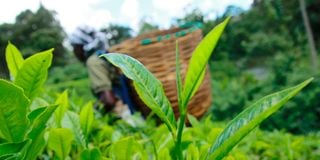Premium
Tea set to defy slump in global commodity prices

A worker picks tea leaves at a farm in Nyeri County on May 25, 2023.
Kenya’s top export, tea, is expected to enjoy stable prices on the global market next year even as nearly all top globally traded commodities see a drop in their earnings due to oversupply, a new projection by the World Bank shows.
The total global commodity price index is projected to fall by 3.4 per cent this year, and 5.1 per cent to 99 points in 2025, the lowest level since 2020-- a shift that would hand a reprieve to consumers but cause losses for investors and traders of the commodities.
The World Bank, in a report analysing commodity markets, says despite global slump that will be caused by an oversupply of oil, tea prices are expected to remain relatively stable supported by a slow recovery in supply amid dwindling demand.
“Tea prices are set to remain fairly flat in 2025, as a limited recovery in supplies in South Asia (especially India) and East Africa (notably Kenya) is balanced by subdued demand growth, particularly in the Middle East,” said the World Bank in a new analysis.
Tea is Kenya’s main export and a slump in prices would not only affect its economy, but also livelihoods of millions of people in the country relying on the cash crop as their primary income source.
Regional top exporters across the globe have mostly recorded a decline this year, with only two countries – Kenya and Bangladesh – posting a growth, which saw a 25 per cent rise in tea production in the six months to June this year.
Uganda recorded the largest drop of over 45 per cent, while India, Sri Lanka, Tanzania, and Malawi also saw their tea production drop largely due to difficult weather conditions.
The estimates by the multilateral lender indicate that the global price of tea on the global market will rise marginally from $4.1 (Sh529.06) per kilogramme to $4.15 (Sh535.52) next year.
However, most commodities will see a drop in the average prices on the global markets occasioned by an oversupply and falling the oil prices globally.
Other agricultural beverage commodities, namely cocoa, arabica coffee, and robusta coffee, will all see a decline in their prices on the international market by 13 per cent, 8.3 per cent, and 6.7 per cent, respectively.
Foods, oils and grains, metals and minerals, and agricultural raw materials are also generally expected to record a slump in prices next year, driving down global inflationary pressures and core inflation rates in most countries.
On the upside, the slump will mean that consumers will enjoy cheaper food and commodity prices, handing many a reprieve after years of elevated prices due to a cocktail of global economic shocks.





